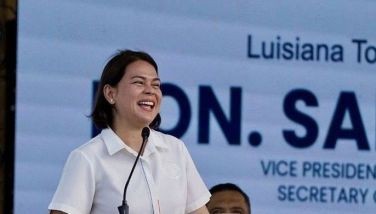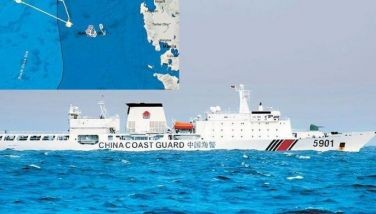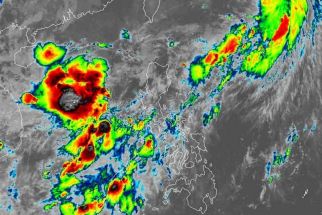Cory's roses and crosses
(The writer was agrarian reform secretary during the presidency of Corazon Aquino.)
MANILA, Philippines - In a still-to-be published and unfinished autobiography entitled “Roses and Crosses,” the late President Corazon Aquino revealed how the imprisonment of her husband, Sen. Benigno (Ninoy) Aquino Jr., by Ferdinand Marcos for seven years and seven months, starting in the early morning of Saturday, Sept. 23, 1972, became a learning experience for her that eventually served her in good stead.
President Cory started writing the book after she stepped down from the presidency on June 30, 1992, using the diary she had religiously maintained from the day Ninoy was arrested. Proclamation 1081 was actually signed by Marcos on Thursday, Sept. 21, 1972 although the order was carried out on Saturday, Sept. 23.
The last public appearance of Ninoy before he was arrested was a speech he gave around 3:30 p.m. at the Asian Institute of Management in Makati at my invitation. In his speech, Ninoy briefed the mesmerized audience on “Oplan Sagittarius” which detailed the choreographed steps to justify the declaration of martial law. After the speech, Ninoy and this writer agreed to meet at the Channel 5 studios along Pasong Tamo Extension in Makati. Before going to the TV station, however, I phoned Ninoy and he rescheduled our meeting for the next day, Saturday, 10 a.m., also at Channel. 5. Ninoy said that he was proceeding to the Manila Hilton to meet some legislators (I recall him mentioning Sen. John “Sonny” Osmena) on tax and tariff matters. A few hours later, Ninoy was arrested by Col. Romeo Gatan and a truckload of soldiers at the Hilton.
This writer obtained permission from Ninoy’s and President Cory’s eldest daughter, Ballsy Aquino-Cruz, to feature excerpts from the unfinished work of the late President for this article in today’s issue of The Philippine STAR which recalls the 37th anniversary of the declaration of Martial Law.
The first time I saw the 53 pages of the manuscript was in late April 2003 when President Cory, to my surprise, passed them on to me for my comments. The surprise turned to honor when I saw, later in the day, that President Cory mentioned me twice in the book. The first time was when I told her that Marcos planned on including Public Works and Highways Secretary Baltazar Aquino in the slate of the Kilusang Bagong Lipunan in the April 7, 1978 election for assemblymen of the Interim Batasang Pambansa, obviously to confuse the voters since Ninoy was expected to lead the Laban (Lakas ng Bayan) opposition slate. It was pointed out that ballots that simply had “Aquino or B. Aquino” written on them could be invalidated.
The second was when she referred to me as one of those who continued to remember her incarcerated husband, thus reassuring Ninoy that “he was not completely forgotten and that he still had some friends left.”
With President Cory’s permission, I gave Br. Andrew Gonzalez, FSC, former Secretary of Education and president of De La Salle University-Manila, a copy of the manuscript for his comments. Br. Andrew, who passed away several years ago and was regarded a prolific writer, intellectual and book critic, commented that “the book is excellent. It is fascinating in its sincerity in recalling historical events and I am sure it will be of interest to a wide audience.”
President Cory’s narration starts with her being born on Jan. 25, 1933 in the old San Juan de Dios Hospital in Manila, the sixth of eight children, two of whom had died in infancy; the eldest, Ceferino at birth and the fifth, Carmen, before she reached the age of two. The last few pages of the unfinished magnum opus talk of the simple celebration in Times Street of her and Ninoy’s 25th wedding anniversary on Oct. 11, 1979, made possible by a 36-hour furlough given Ninoy by Martial Law authorities.
President Cory talks of a happy childhood “that wasn’t all fun and games; for the bulk of our time was taken up by school.” According to President Cory, her mother, the former Demetria Sumulong, insisted on good grades, respect for elders and no quarreling among the children (at least, not in her presence). President Cory writes of living simply, not out of necessity, “but out of an ingrained distaste for excess. I wore hand-me-down (school) uniforms of my Ate (Josephine Reyes), which were also worn by Terry (Lopa), but unfortunately, I couldn’t convince my mother about the importance of wearing new uniforms.” In an aside, President Cory would say, “When I became a mother, I made sure that my daughters would always have new uniforms every year.”
The book title, Roses and Crosses, is also the title of one of President Cory’s paintings. She painted seven crosses of different sizes to represent the seven years and seven months of Ninoy’s incarceration and also the seven coup attempts against her presidency. She painted numerous roses, large and small, of different hues to represent the many happy and joyful events in her life.
In offering glimpses of herself and martial law, President Cory writes that like everyone else in this world, she had her share of problems. Before Sept. 23, 1972, the day of Ninoy’s arrest and imprisonment, President Cory wrote: “My problems were very minor ones and of the solvable kind. It seemed to me then, that either Ninoy or I or my parents could easily find a solution to my problems. Looking back and comparatively speaking, my worries then were really nothing to worry about.”
While admitting that she experienced much sadness and pain during Ninoy’s incarceration, still there was so much more to be thankful about. President Cory wrote: “I suppose it had to be during those very trying times that Ninoy fully appreciated everything I did for him. Before Martial Law, Ninoy could do everything himself. Besides, he was very much against meddling wives of elective officials, as in the case of Imelda Marcos, and that is why I never took part in his meetings even if the meetings were sometimes held in our home. With his imprisonment, Ninoy had to depend on me for almost everything. He was forced to be isolated from almost everybody, and I in turn was forced out of my private life and (had) to deal with opposition leaders, the media, his (12) lawyers, and the military authorities. On one of my conjugal visits, Ninoy jokingly said that he was so thankful that he married me instead of someone else who he felt would just be crying and crying throughout his imprisonment. He would also tease me and try to imagine what my life would have been like if I had also had a different marriage partner.”
Instead of weakening the familial bonds, President Cory said martial law strengthened family ties: “My children and I became super close to each other during martial law. We could also talk to each other in codes whenever we used the telephone. When Ballsy started to work, Ninoy suggested to her to buy gifts for her two grandmothers from her first paycheck. It was a very good suggestion and the two grandmothers were happily surprised with the thoughtful gesture. Whenever I could help my children with their homework, I would be glad to do so, if only to take my mind off the harsh reality of martial rule. In fact, I first learned about ‘haikus’ from my daughter Viel.”
As expected, the unfinished book reaffirms President Cory’s complete surrender to the Lord’s will: “I am fully convinced that I would not be the person I am today if I had not gone through the tremendous learning experience of Ninoy’s imprisonment years. I believe that any person can surmount any trial or problem. The important thing is to do one’s best and then entrust the rest to the Lord. I used to cry a lot at the beginning of martial law, especially when I would be relating to relatives and close friends about the harsh and cruel treatment inflicted on Ninoy. At the same time, I promised myself that I would never cry in front of the military authorities in Fort Bonifacio and I never did. I tried not to cry in front of my children or my parents so as not to cause them greater worries. Years later, my children told me that not seeing me cry made them that much stronger and braver.”
It is clear that the inner strength and courage that martial law helped develop within Ninoy and President Cory fortified them both. This courageous spirit will certainly serve to inspire those who have the heavy responsibility of continuing the struggle for freedom that both Ninoy and President Cory waged.
- Latest
- Trending






























